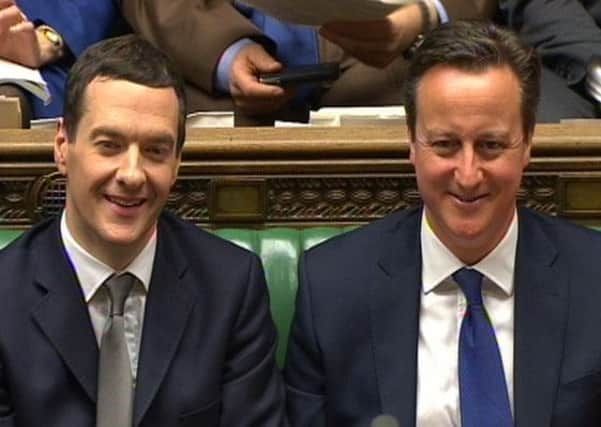Tom Richmond: The coalition is working...and so at last is Britain


The very fact that the Tories and Liberal Democrats are still talking – and functioning as a competent government – five years after forging the first peacetime coalition since Lloyd George’s era is proof positive that consensus politics can still trump the tribalism that will be self-evident in the general election campaign.
Not only did Nick Clegg turn up for the Budget after going walkabout to Cornwall during last year’s Autumn Statement, but the Lib Dem leader even raised several smiles during George Osborne’s speech which rendered redundant five years of dire foreboding from Labour about a so-called cost of living crisis.
Advertisement
Hide AdAdvertisement
Hide AdAnd the Deputy Prime Minister had good reason to take his seat on the Treasury’s green benches – the Chancellor’s flagship tax policy, the promise of further increases in personal allowances to £11,000, is actually a legacy of the coalition agreement so famously unveiled by Mr Clegg and David Cameron in the 10 Downing Street rose garden.
It wasn’t meant to be like this – it was the Conservative leader, after all, who rather derided the idea of easing the tax burden on the poorest when the issue was discussed in the very first TV election debate in April 2010.
Mr Cameron’s words are worth repeating: “I would love to take everyone out of their first £10,000 of income tax, Nick... we cannot afford it.”
How ironic, given the continuing row over this year’s on-off election debates. Not only has the original objective of £10,000 been achieved, but it will rise to £10,600 in two weeks’ time before reaching £10,800 next year and then £11,000 the following year.
Advertisement
Hide AdAdvertisement
Hide AdAnd there are also reports that the forthcoming Tory election manifesto will include a desire to allow the first £12,500 of earnings to become tax-free as the Conservatives look to win back the blue collar workers – traditional Labour voters – whose support was critical to the Thatcher and Major governments.
Not that Mr Osborne was in a mood to show much charity to his junior coalition partners and his Lib Dem deputy Danny Alexander, whose approval ratings continue to outperform those of several Tory Ministers according to polling by the influential ConservativeHome website. He offered one crumb to the Lib Dems, conceding that this policy was being delivered by “a coalition government and a Conservative chancellor”.
Yet, as Tory grandee Ken Clarke confirmed, this has always been a Lib Dem policy and his own attempts to introduce such changes in the mid-1990s were thwarted by the reluctance of his own party.
Mr Osborne has many reasons to be grateful to the Lib Dems. Without their support – and the assuredness of the aforementioned Mr Alexander – Britain would have been mired in political deadlock for five years. Instead, there are now a record number of people in employment as aspiration once again becomes a cornerstone of this country.
Advertisement
Hide AdAdvertisement
Hide AdAnd the Lib Dems have also provided Work and Pensions Secretary Iain Duncan Smith with the political cover he needed to undertake radical welfare reforms that have incentivised the out-of-work – and specifically the career jobless – to seek meaningful employment. He could not have had a more able deputy in Steve Webb, another of the coalition’s unsung heroes.
Perhaps it would have been better if both the Tories and Lib Dems had done more to credit each other with policy successes – after all Mr Clegg’s party would not have been able to shape the recovery without Mr Osborne being more amenable than many had forecast.
Looking back five years to the tumultuous days after the 2010 election, there was a sense of urgency when David Cameron made his “big, open and comprehensive offer” to the Lib Dems – the economic crisis at the time necessitated the need for a strong and stable government that would pass the test of time. It has done so. The problem this May, in the likely event of a hung parliament, is that the needs of the economy – still this decade’s defining issue – will play second fiddle to narrow political interests.
This would be a mistake. For, in many respects, the Chancellor’s final Budget of this Parliament was a vindication of the coalition and the tangible progress made on balancing the nation’s books, reinvigorating the North and advancing an agenda of aspiration so people in all income brackets are rewarded for endeavour.
Advertisement
Hide AdAdvertisement
Hide AdOf course more could have been done – George Osborne quickly became aware of the fact that it would take two parliaments to eradicate the deficit – but political history is likely to be kinder to this coalition than many of the current critiques. It should be remembered as the government that got Britain back to work.
And, looking at some of the possible political pacts that might have to be forged on May 7 if the electorate, as all the opinion polls suggest, chooses not to entrust one single party with the governance of the nation, another alliance between the Tories and Lib Dems might – just – prove the least worst option. As Mr Osborne made clear himself, his work is only half-done and it is still difficult to see how the Conservatives can win sufficient votes to finish the job on their own.